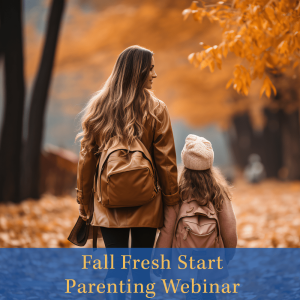Parenting Tools For Conquering Crisis Situations
No matter the age of children, no matter the family, some moments just feel like or look like chaos. Dirty dishes everywhere, nagging, siblings fighting, people not getting in the car quick enough, whining, laundry piled up all over, toys underfoot, music blaring…where is the calm?
This story is regular life for many families. It can be physically, emotionally and even spiritually draining on all the family members.
If this is regular life, what would life be like if a new change took place like a new baby, the loss of a job or family member, a health crisis, or a move to a new house? These are times of great commotion. During these transition periods of life, just getting dinner on the table can seem like a miracle. And, considering the circumstances, it probably is. Be sure to thank God for each small miracle as they happen. Your habit of gratitude for the daily, often even commonplace, miracles will increase your joy and multiply your ability to rise in adversity. Beyond gratitude, there is a very important skill you should master if you want to be able to mitigate the negative effects of crisis situations.
Parenting Tools For Conquering Crisis Situations
In a recent phone call with a friend, the conversation turned to the near arrival of her third baby. She shared with me her deep desire to be able to conquer herself and learn self-government before the baby is born. She has been working on mastering self-government for a while now and doesn’t feel perfect at it yet, and a new chaotic transition time is almost here.
First I explained to her that even I am not perfect at self-government yet and I’ve been working on it since I was 14. Even I have moments from time to time that I need to learn from or re-do altogether. So, the best she can hope for at this time is steady improvement. Perfection will only be achieved after years of implementation and deliberate action. All truth is learned this way.
Next we talked about what she could do to make this transition period easier for all of her family members. I shared with her my secret to transition times. This one parenting skill made the times with a new baby run more smoothly, and helped me remain calm. And I continue to use this skill for everyday craziness and to make home life more predictable and calm. The skill is pre-teaching.
I know many of you have heard me speak about this skill in presentations and in the bookParenting A House United. However, I hope that this discussion will help you better utilize the skill to help calm the chaotic times and make life flow more smoothly.
Preparing The Family To Succeed
When I speak about this parenting skill, I usually talk about how all skills for obedience like “following instructions and disagreeing appropriately” must be taught ahead of time to decrease anxiety, teach cause and effect, and to allow for obedience to really occur, because the definition of obedience says that a person must first learn the law and then they can be obedient to it. (Websters 1828 Dictionary) Therefore a parent should pre-teach what skill the child should prepare to use right before an instruction or “no answer” is given.
When talking to my pregnant friend, I explained that if she used pre-teaching, the transitional period after the baby’s arrival would more smooth and calm for her family. She was intrigued by this. I explained the way she could use pre-teaching for everything.
Deliberately explaining what is about to happen always calms a crisis before the it occurs. This is how it works.
Let’s sau my friend decides the time has come to do something, like feed the baby for example. This is a perfect moment to pre-teach. She gathers her other two children to her and explains what will be happening for the next 20 minutes, what their options are for appropriate activites, and how to ask for help if they need it.
Likewise, if my friend notices that i’s time to put the baby down for a nap, then she quickly gathers the other children and explains what she’s doing, how they need to talk softly, and and where they need to play to keep the noise down.
Before making dinner, she can pull the children to her and explain the process she’s going to start. She can give assignments to help with baby or to help with food preparations, or she can give them direction so that she can quickly make the meal on her own.
Once you start thinking about it, the applications for this principle are endless.
What Pre-Teaching Does For The Development Of Children
I know it sounds like this young mother of three is going to be talking and explaining all day long, and I know that there is still one person who doesn’t understand pre-teaching: the baby. But the infant will gain from this experience too. Listening to his mother pre-teach his siblings will increase his vocabulary, help define his notion of a mother’s role, and will eventually help him learn the skills he needs to develop as he gets older.
Is it bad to have a mother talking all day long? While it may be a bit wearying,because it requires exerting more thought and effort to connect constantly throughout the day, it’s needful for establishing habits of discipline in her family that will pay off in the end. For example,it constantly remind each mother to connect with her children and it helps her feel more in control of the home environment. It reminds a mother constantly to look at situations objectively instead of emotionally, at a time when her emotions could run high. While she is preparing her children for situations she is simultaneously preparing herself as well. As she explains the upcoming situation and how she will handle problems, she no longer needs to stress about what to do if a problem occurs. She already has a plan.
Continuous pre-teaching is also good for children, because they regularly get invited to connect with mother at a time when she might be more inclined to disconnect due to stress. They also feel their needs are being more understood and met because they have more talk time with mom and she is consistently discussing their needs. This makes children feel less anxious and more calm.
When a mother has these small pre-teaching meetings with her children, she is also preparing them to process their role in daily life from a group or family perspective. She is showing them over and over again that they are part of a group and that they need to recognize the needs of all people in the group. This prevents selfish tendencies as children grow up.
Frequent conversations with a mother also teaches children about what it means to be a mother or parent. Kids are more observant of and prepared for what mother is going to do each day. They become more grateful for their time with mom and their love for her increases. This all occurs because they don’t take mother’s role as much for granted due to the opportunity they have had to discuss the role and duties associated with that role all day long.
Another lesson children learn from regular pre-teaching is cause-and-effect. When mother pre-teaches more often, she will naturally become more consistent and catch the behaviors that she previously anticipated occurring. This means the children will have a more alert teacher. And, when mother doesn’t get emotional about behaviors she is also an emotionally safer teacher.
Additionally, the language and problems solving skills of the children will improve, no matter their ages. Discussion with adults always leads to increased vocabulary and understanding of life. Mothers who talk to their children more often turn out more aware and intelligent children. What a blessing these problem-solving beginnings will be for the children as they attempt learning self-government throughout their lives.
The last benefit of pre-teaching is that children are prepared to succeed in the upcoming situation you are prepping them for. When a parent pre-teaches a child before a situation occurs, the child is much more likely to choose the correct behavior immediately following the discussion. And, after making a correct decision and being praised by mom (Don’t forget to have follow-up praise and positive consequence times), children are likely to choose to repeat the positive behavior on their own. The first instance gives them a positive experience to build on and trust in when making decisions in the future.
Hopefully it is easy to see that acting deliberately, by simply pre-teaching throughout the day, can create long-term positive results for relationships, families and self-governing. It will transform chaotic homes with calm, connected home cultures.
This article is my gift to my friend, new mothers everywhere, and all families experiencing transition times. I figured all this out on my own so that other mothers could learn from my experiences. We may not all be perfect at being calm every second of the day, but this small skill can and does make calmness much more easy. May God bless you all in your trials and transitions. If there is one thing that is certain, it is that life is always changing. The good thing is, we are always changing and growing too.
Listen to the audio class The Power Of Calm here. Cultural Parenting Revolution or Popular Parenting Methods will also offer a productive assessment for parents wanting to create calmer environments at home.





